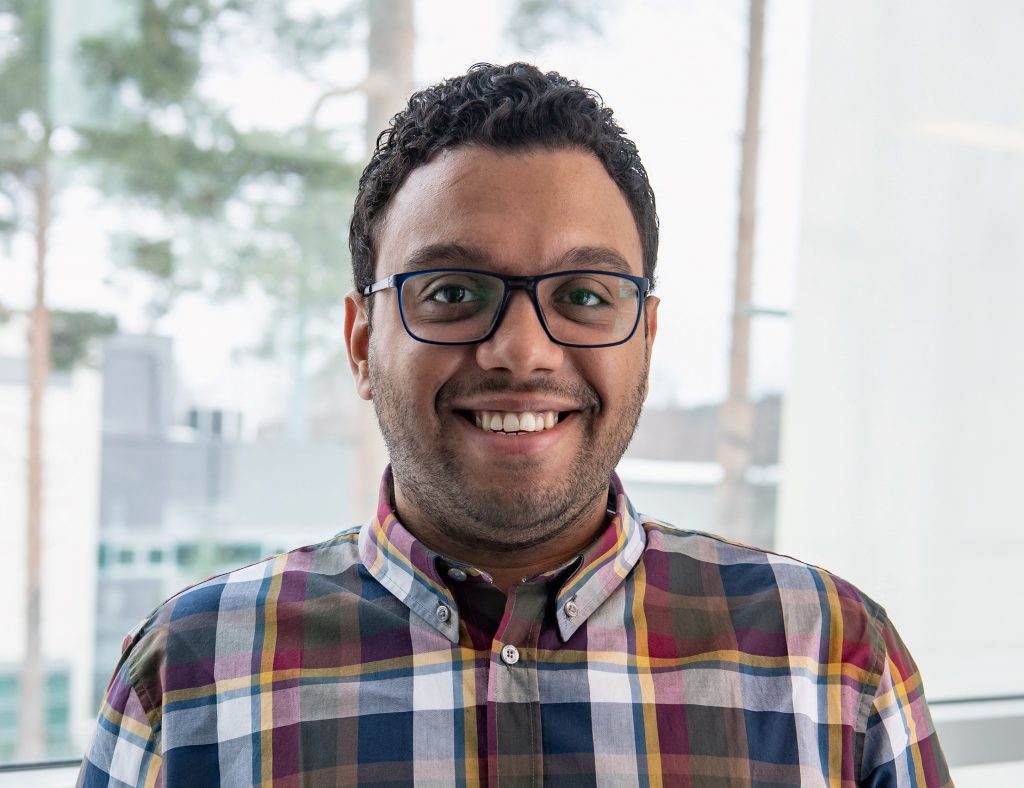16.9.2022 Ahmed Mohamed: Science is not a solo sport!
Ahmed Mohamed: Science is not a solo sport!
My name is Ahmed, a young researcher from Egypt. My background is Pharmacy and Biotechnology. I have studied in Egypt (Tanta University), Sweden (Skövde; Swedish Institute Study Scholarship) and now Finland (UEF-Neuro-Innovation program MSCA-COFUND). Starting my career as a community pharmacist, I assisted the patients with the right instructions on how to handle the medications and their wellbeing. It was an enjoyable period, but sooner, I realized that it would be more fulfilling to be a developer than an end user. Excitement filled me up when I was moving to Sweden to kick off the next chapter of my life. When my studies were finished, sooner than I realized, the COVID pandemic started to escalate and the uncertainty got gloomier. However, after the storm, there is always sunshine. I found myself already in the next chapter involved in cutting-edge research in a new place, Finland. Truly, engaging in different cultures played a critical role in my personal and character development as well as my career path.

My work is part of the Alzheimer disease and Air pollution (ADAIR; from air pollution to brain pollution) project which is part of the EU Joint Programme – Neurodegenerative Disease Research (JPND) project. It is on the topic of air pollution and its effects on the immune system in both healthy individuals and Alzheimer disease (AD) patients. AD develops over the years and currently, it is hard to diagnose at an early phase of disease. Similarly, air pollution accumulates harmful effects on our health with no proper methods to quantify or predict them accurately. We aim to reveal:
- What air pollution changes in various blood cells
- How air pollution contributes to the development of AD as well as our brain health
- Discover novel biomarkers that enable the detection of air pollution risks on our health
The biomarkers will come in handy as an accessible and quick way to check if a person is likely to have certain complications (specifically AD) from air pollution. Commercially, this could be available as a simple kit (such as what we have witnessed with the COVID-19 tests). Hence, reducing the economic burden caused by AD and even other lung, heart and brain diseases. Additionally, since our air quality is directly affecting the climate of the earth, the outcomes of our research could guide political decisions for efficient reduction of air pollution.
How can we achieve these goals?
Briefly, we get our unique human samples from Sweden and run experiments on them in Finland and Czech Republic. The work performed at our lab, comprises of investigating the transcriptome (cell products) and epigenome (cell regulators) of the immune cells. For this, we use two approaches: in-vivo (on humans) and in-vitro (in the lab). The first approach is conducted directly on the samples that we get from Sweden by using established techniques. With the second approach, we need to extensively test and optimize the experimental part to obtain reliable results. Our last step is to analyze the results to gain meaningful interpretations. Then, we use already-available data from Netherlands and China to validate our conclusions. The results will be representative for the population because of the data integration (from Sweden, Netherlands and China). The final integrative analysis of the data is performed in Italy. Transferring knowledge to public and other political parties is carried out through partners in Luxembourg.
Teamwork offers the possibility to share different ideas and open new doors behind which the magic happens: “innovation”.
As you can see, this work is not the sole production of our lab, but involves massive multinational collaborations. It is also an integration between neuroscientists, environmental scientists, clinicians, epidemiologists, informaticians and non-profit organizations. Participating partners in this project are:
- International renowned universities and institutes (such as University of Eastern Finland in Finland, University of Verona in Italy, Erasmus MC in Netherlands, University of Umeå in Sweden, The Czech Academy of Science and Institute of Experimental Medicine in Czech Republic and Sun Yat-sen University in China)
- Foundations (Alzheimer Europe in Luxembourg)
- Companies (BioTalentum in Hungary)
Now, imagine only one entity that would solely carry out all of this. Do you think the same goal could be achieved?
My answer would be “Definitely, not”. Teamwork offers the possibility to share different ideas and open new doors behind which the magic happens: “innovation”.